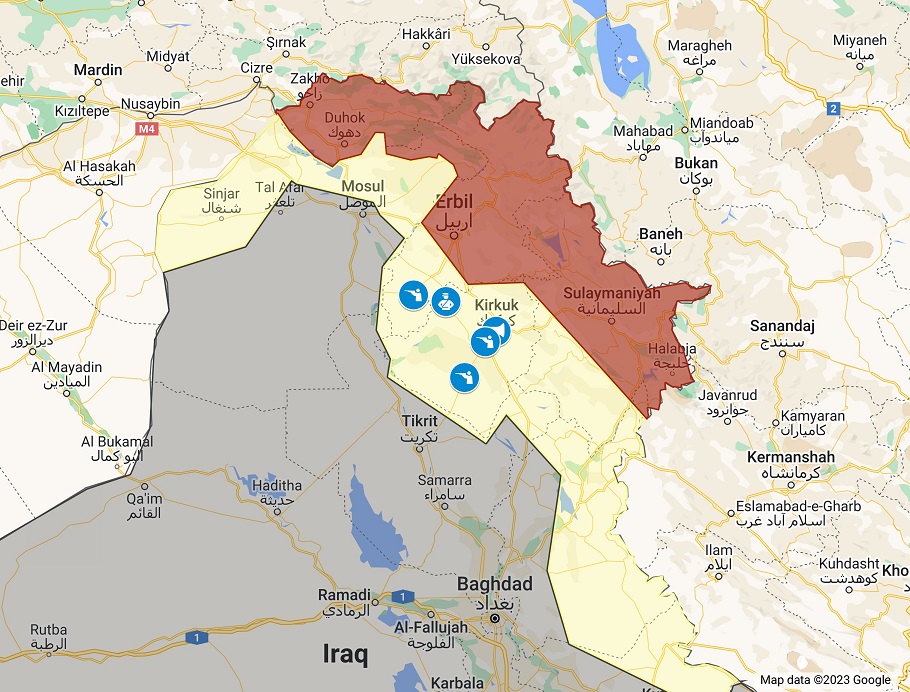924
A biweekly brief of events and news occurred in the disputed territories.
Kirkuk
- On the sixth anniversary of the October 16th attacks by Iraq and Iranian-backed militias on the Kurdish region, the 11th division of the army conducted a raid on the former military base located in Topzawa village. This site had been infamously used by the former Iraqi regime to commit massacres against the Kurdish population during the late 1980s, known as the Anfal Campaign. The residents of the village, along with civilian activists, protested the army’s occupation and called on the federal government to erect a monument at the site to commemorate the victims of the former regime. Simultaneously, numerous Kurdish lawmakers and officials applied pressure on the federal government to halt the reutilization of this site as a military base. On October 19, following ongoing protests, the military units withdrew from the site.
- On October 24, the Iraqi army arrested twenty Kurdish farmers in a village within the Sargaran subdistrict. The arrest of these Kurdish farmers occurred in response to complaints filed by Arab settlers who claimed that the land used by the Kurdish farmers rightfully belonged to them. After 24 hours, the farmers were released pending further investigation. This area had previously suffered from Arabization policies, and the current Iraqi government has allowed the settlers to lay claim to lands they occupied during the rule of the former Ba’ath regime.
- The Turkish-backed Turkmen Front issued a statement expressing strong disapproval of the removal of one of the party’s candidates from the upcoming elections by the Accountability and Justice Commission. The candidate, Turhan Abdulrahman, faced accusations of holding a senior membership in the al Ba’ath regime, which contravenes election laws. Abdulrahman, a retired police general and deputy commander of Kirkuk’s police. “The goal of this step [removal] is to influence the Turkmen voter to discourage widespread participation in the elections so that the conspirators succeed in passing their evil agenda regarding Kirkuk Governorate,” read the statement. Several other candidates in Kirkuk have also been disqualified on similar charges. On December 18, Kirkuk is scheduled to hold provincial council elections for the first time since 2005. Meanwhile, the former leader of the Turkmen Front, Arshad Salahi, who currently serves as a lawmaker, called for an “audit” of the voter registry, accompanied by a warning of “serious consequences” if the process is not carried out. As of October 24, the election campaign has commenced, further heightening tensions among political parties and ethnic groups.
- On October 23, intense fighting erupted between anti-terror forces and Da’esh terrorists in the Rashad district. According to reports, anti-terror forces were deployed via three helicopters near the village of Mahmudiyah in the Rashad district of southern Kirkuk. Unfortunately, during the operation, the security forces fell into a Da’esh ambush.
Makhmour
- On October 13, a Turkish drone struck the Makhmour Refugee Camp, which has housed Kurds from Turkey since the 1990s. This airstrike marked the second within a week. The earlier strike on October 7 resulted in injuries to four civilians. Additionally, on October 19, an armed faction of the Kurdistan Workers’ Party (PKK) withdrew from its positions near the Makhmour camp. These fighters had initially established their positions in 2014 to repel ISIS (Da’esh) attacks on the camp. However, on October 22, clashes erupted between the Peshmerga forces and the Iraqi army near the camp, stemming from a dispute over control of the positions vacated by the PKK. This confrontation led to casualties, with four Peshmergas, including two senior commanders, and two Iraqi soldiers losing their lives, and at least 12 individuals from both sides sustaining injuries. The military posts are situated near the Qarah Chokh mountain. Subsequently, both sides agreed to establish an investigative committee.
Shingal (Sinjar)
- On October 18, the Investigation and Collection of Subordinate Evidence Committee of the Kurdistan Regional Government (KRG) initiated the excavation of mass graves in Shingal. These mass graves have been discovered since the Yazidi Genocide in 2014, with a total of 110 identified so far. On the same day, a monument dedicated to the memory of the Yazidi Genocide was unveiled in Sinjar. Named the “Mothers’ Grave,” this monument was constructed through the efforts of the Nadia Initiative and the International Organization for Migration in Iraq, with support from the United States Agency for International Development (USAID).

